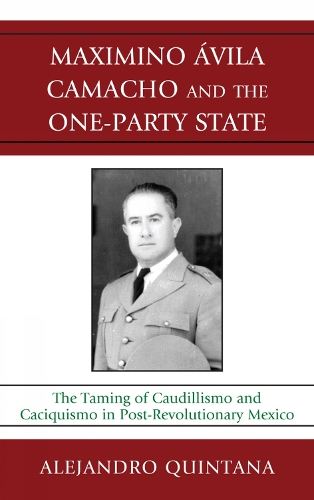
Maximino Avila Camacho and the One-Party State: The Taming of Caudillismo and Caciquismo in Post-Revolutionary Mexico
(Hardback)
Publishing Details
Maximino Avila Camacho and the One-Party State: The Taming of Caudillismo and Caciquismo in Post-Revolutionary Mexico
By (Author) Alejandro Quintana
Bloomsbury Publishing PLC
Lexington Books
8th March 2010
United States
Classifications
Professional and Scholarly
Non Fiction
Political ideologies and movements
Nationalism and nationalist ideologies and movements
B
Physical Properties
Hardback
174
Width 163mm, Height 241mm, Spine 17mm
411g
Description
Maximino Avila Camacho and the One-Party State: The Taming of Caudillismo and Caciquismo in Post-Revolutionary Mexico is a political biography of General Maximino Avila Camacho (18911945), one of the most powerful regional politicians in Mexico from 1935 to 1945. He was a member of an officially sponsored party, known today as the Institutional Revolutionary Party (PRI), which claimed to represent the goals of the Mexican Revolution (19101921) and which managed to win most federal and regional elections from 1929 until its first presidential defeat in 2000. Maximino (as he is commonly known) became a powerful politician at the time when the official party effectively transformed the Mexican political system from one based on the personal power of regional strongmen and political bosses relying on clientelistic networks (popularly known as "caudillos" and "caciques") to a modern one based on a centralized civilian administration supported by institutions. The story of Maximino, the powerful cacique of the state of Puebla, demonstrates that the emergence of the one-party-dominated Mexican state did not destroy caudillos and caciques but simply controlled them. Specifically, it shows how the official party incorporated these leaders and their authoritarian practices into the state's political machinery. The result was 71 years of one-party political domination based on a political culture that emphasized patronage, favoritism, corruption, coercion and co-optation. By tracing Maximino's career, from revolutionary soldier to powerful political leader, we learn how and why the goals that had originally inspired the "party of the revolution"primarily democracy and social justicewere sacrificed in order to empower it.
Reviews
In this well-researched and nuanced study, Alejandro Quintana offers a judicious yet devastating blow to any lingering arguments for a benign Mexican revolution in regard to the advancement of democratic structures and social justice. Indeed, Maximino, not Madero, is the truly iconic figure of Mexico's epochal twentieth-century conflict and its aftermath. -- David G. LaFrance, Benemrita Universidad Autnoma de Puebla, Mexico
This political biography of the legendary political boss who aspired to the presidency of Mexico provides a new perspective into workings of power politics in the wake of the Mexican revolution. Its careful reconstruction of the career and outsized personality of Maximino vila Camachomilitary man, governor of Puebla, brother of a presidentis a quintessential story of caudillo politics and the making of political dynasties in the turbulent 1920s, '30s, and '40s. Anyone interested in the mechanisms of post-revolutionary politics and the formative years of the "perfect dictatorship" of Mexico's PRI will want to read Alejandro Quintana's book. -- Christopher Boyer, University of Illinois at Chicago
Quintana provides helpful insights into the national setting. * The Americas: A Quarterly Review of Latin American History *
Without denying that he was more colorful, ambitious, and talented than most of his contemporaries, Quintana presents us with a politician who, he argues, was fairly typical of his milieu. Quintana is clearly less interested in the scandalous details of Maximinos life than in the political culture in which he operated. * Hispanic American Historical Review *
Author Bio
Alejandro Quintana is assistant professor of history at St. Johns University.
